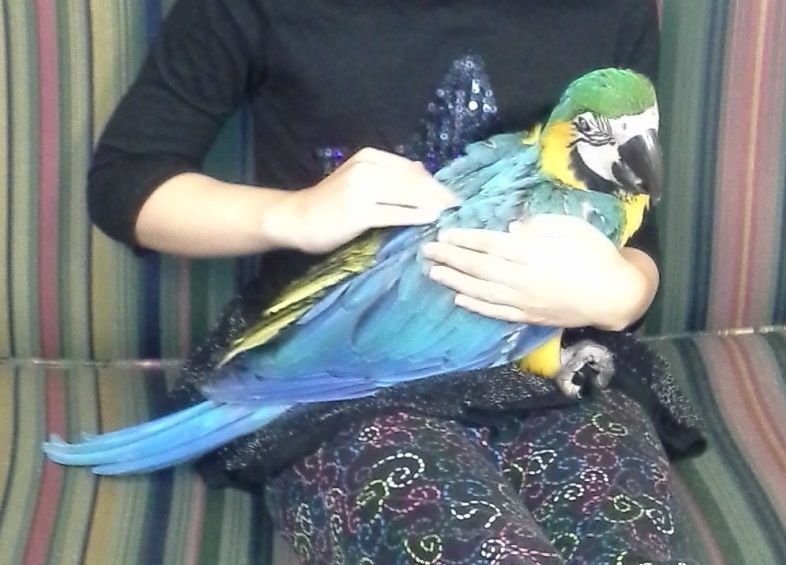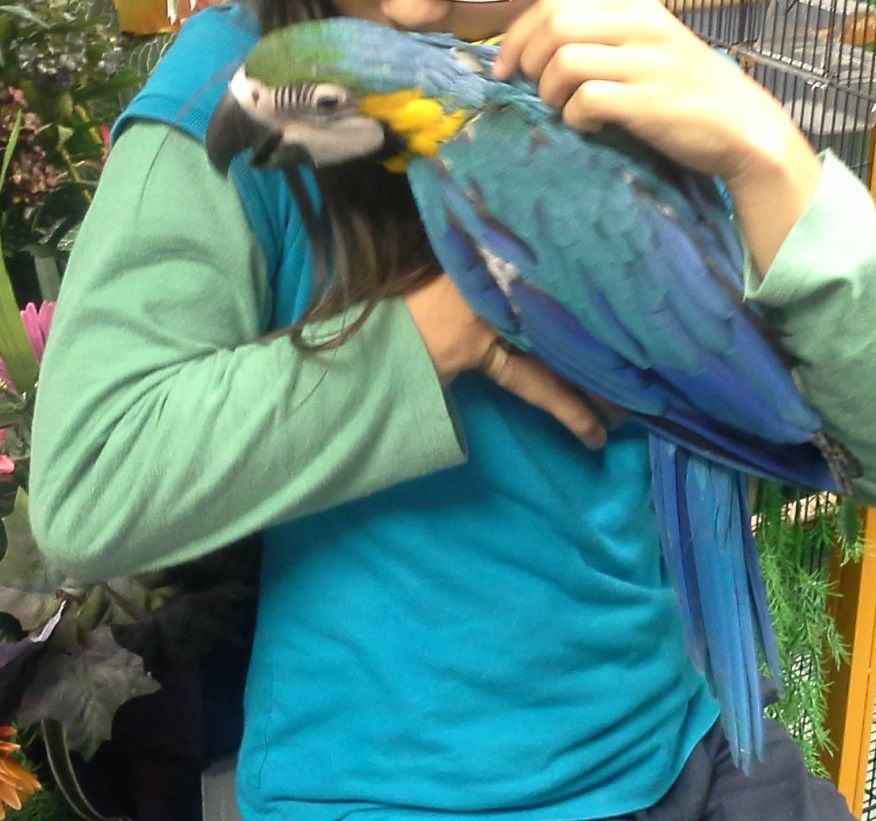After a lot of research, thinking, planning, debating with ourselves, our family is very strongly considering adding two birds to our family (myself, my wife, and 2 daughters - 12 and 8 years old). One of the birds is a female blue and gold macaw (born this July, not ready to come home with us for a few more weeks). 
A few things I am curious about:
1) Are there telltale signs about the healthiness and condition of a macaw? She looks healthy and happy as far as I can tell. She's extremely friendly, steps up just fine, likes being held, and is incredibly gentle with her beak. Here are some pictures of my daughters holding her:


I really like the breeder/shop and every bird we've seen there is extremely friendly. Even the older rescues there that I have interacted with have been quite friendly (though not as much as the babies, for obvious reasons). But I have no idea how to tell if a bird seems to be healthy and starting off in great shape.
I know what to look for in dogs, and ways to test their personality (seeing how they respond to being on their backs, for example). If there is anything you can check for with birds (or a macaw specifically), I'd love to know!
2) Our goal is to not only spend time with her at home, but also take her with us to work often where she'll also meet more people. We own a video game development company. We don't have customers at our studio, but we do occasionally have visitors in addition to the people who work there. Any concerns here?
3) Assuming we spend a lot of time with her and heavily socialize her, what can we generally expect as far as negative behaviors? I know birds are all individuals and can behave very differently. So I am asking in general terms. Here I am asking about things like biting, messiness, destructiveness, loudness, and things we need to worry about.
To what extent can these "negative" behaviors be mitigated with good training, socialization, and discipline on our part? (by discipline, I mean OUR discipline - not spoiling her, putting her away if she is bad/loud/destructive/etc.)
4) Again, assuming all the above, what can we generally expect as far as positive behaviors? It is my understanding that b&g macaws are "lap birds", and love to be held, have their bellies rubbed, and that sort of thing.
I also understand they they tend to be good talkers, can learn a lot of tricks or ways to communicate (blowing kisses, waving, singing, etc).
5) Any other things I really should be thinking about or considering here? Personality tendencies I should consider, specific things we should do in preparation before adding her to our family, or really any advice or suggestions would be very welcome.
Also, in case it is a factor: the other bird is a sun conure. The two birds were babies together, are used to each other, and often each from the same bowl. I know the size difference is significant and we will always be watching them when they are out and about. We have a corgi so that's already something we know we have to do any time we have the birds out.
Thank you!

A few things I am curious about:
1) Are there telltale signs about the healthiness and condition of a macaw? She looks healthy and happy as far as I can tell. She's extremely friendly, steps up just fine, likes being held, and is incredibly gentle with her beak. Here are some pictures of my daughters holding her:


I really like the breeder/shop and every bird we've seen there is extremely friendly. Even the older rescues there that I have interacted with have been quite friendly (though not as much as the babies, for obvious reasons). But I have no idea how to tell if a bird seems to be healthy and starting off in great shape.
I know what to look for in dogs, and ways to test their personality (seeing how they respond to being on their backs, for example). If there is anything you can check for with birds (or a macaw specifically), I'd love to know!
2) Our goal is to not only spend time with her at home, but also take her with us to work often where she'll also meet more people. We own a video game development company. We don't have customers at our studio, but we do occasionally have visitors in addition to the people who work there. Any concerns here?
3) Assuming we spend a lot of time with her and heavily socialize her, what can we generally expect as far as negative behaviors? I know birds are all individuals and can behave very differently. So I am asking in general terms. Here I am asking about things like biting, messiness, destructiveness, loudness, and things we need to worry about.
To what extent can these "negative" behaviors be mitigated with good training, socialization, and discipline on our part? (by discipline, I mean OUR discipline - not spoiling her, putting her away if she is bad/loud/destructive/etc.)
4) Again, assuming all the above, what can we generally expect as far as positive behaviors? It is my understanding that b&g macaws are "lap birds", and love to be held, have their bellies rubbed, and that sort of thing.
I also understand they they tend to be good talkers, can learn a lot of tricks or ways to communicate (blowing kisses, waving, singing, etc).
5) Any other things I really should be thinking about or considering here? Personality tendencies I should consider, specific things we should do in preparation before adding her to our family, or really any advice or suggestions would be very welcome.
Also, in case it is a factor: the other bird is a sun conure. The two birds were babies together, are used to each other, and often each from the same bowl. I know the size difference is significant and we will always be watching them when they are out and about. We have a corgi so that's already something we know we have to do any time we have the birds out.
Thank you!